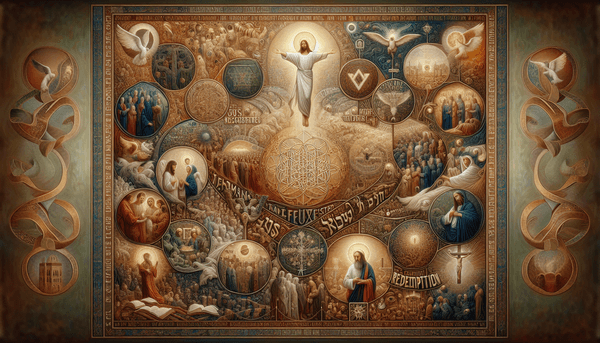Jesus and His Jewish Heritage
The lineage of Jesus Christ is meticulously chronicled in the Gospel of Matthew, tracing his roots back to King David (Matthew 1:1). This genealogy is not merely a historical record but a testament to Jesus' fulfillment of Jewish messianic expectations. As a descendant of David, Jesus embodies the covenantal promises of the Old Testament. His earthly parents, Mary and Joseph, likewise anchored in Jewish tradition, journeyed to Bethlehem in obedience to Jewish customs (Luke 2:4-5). Their faithfulness to the Jewish faith underscores the Messiah's authentic connection to the tribe of Judah (Hebrews 7:14), born under the law to redeem those under the law (Galatians 4:4).
Jesus' Care and Concern Demonstrated on the Cross
The poignant scene recorded in the Gospel of John, where Jesus addresses his mother Mary and the beloved disciple, reveals the depth of Jesus' compassion and his respect for familial bonds (John 19:26-27). As the eldest son, Jesus fulfilled his cultural duty to ensure Mary's care, entrusting her to the disciple he loved. This act not only reflects Jesus' concern in the midst of suffering but also illustrates a new spiritual kinship among believers, an embodiment of the call to care for one another within the family of God (1 Timothy 5:8, Matthew 12:48-50). The early church, as members of God's household (Ephesians 2:19), would come to embrace this ethos of mutual support and unity, as expressed in the interconnectedness of the body of Christ (1 Corinthians 12:26).
The Mystery of God's Will in Ephesians 1:7-10
Paul's letter to the Ephesians delves into the profound themes of redemption and grace. In Ephesians 1:7-10, he speaks of the forgiveness of sins and the riches of God's grace, lavished upon us through Christ. The passage illuminates God's ultimate plan to unite all things in heaven and on earth under Christ, a divine initiative that harmonizes the cosmos. This unity, achieved through the reconciliation of all things by Christ's blood (Colossians 1:19-20), is central to understanding God's purpose for his creation. As believers, we are invited to align ourselves with this grand design, becoming instruments of peace and reconciliation in a fractured world (Ephesians 2:13-14), as we work together for the good that God has purposed (Romans 8:28). We rejoice in our redemption, not with perishable things like silver or gold, but with the precious blood of Christ (1 Peter 1:18-19).
Conclusion
Through the exploration of Jesus' names and actions, and the apostolic writings, we uncover layers of meaning that underpin the Christian understanding of God's redemptive plan. Jesus, called Emmanuel, brings God's presence to us, fulfilling ancient prophecies and bridging the gap between heaven and earth. His Jewish heritage and his adherence to familial responsibilities highlight his human identity and divine purpose. The unity of believers, as depicted on the cross and in Paul's epistles, calls us to a higher standard of love and community. This theme of love and its divine implications are further explored in our related exploration of biblical passages. Collectively, these insights invite us to a richer, more nuanced appreciation of the scriptures and encourage us to seek a deeper relationship with the divine narrative they reveal.






